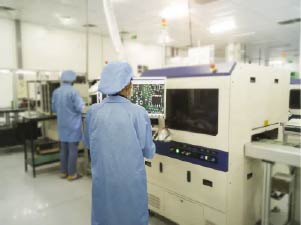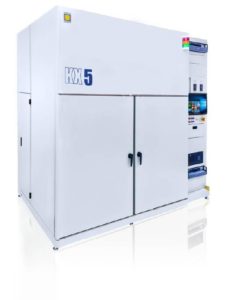
Power Temperature Cycle Testing for Semiconductor Devices: Ensuring Reliability and Performance
Introduction
Power Temperature Cycle (PTC) testing is a fundamental procedure used to assess the reliability and durability of semiconductor devices under extreme thermal and electrical conditions. This testing method is crucial for identifying potential failures and ensuring that semiconductor devices can withstand the harsh environments they may encounter during their operational life. Companies like KES Systems Inc. play a pivotal role in designing and manufacturing specialized equipment for PTC testing, leveraging their extensive experience and expertise to deliver high-quality solutions.
Importance of Power Temperature Cycle Testing
Semiconductors are integral to modern electronic devices, from consumer electronics to automotive and aerospace applications. The performance and longevity of these devices depend significantly on their ability to endure thermal and power stresses. PTC testing simulates these conditions, exposing devices to repeated cycles of high and low temperatures while applying and removing electrical biases. This process helps to:
- Identify Latent Defects: PTC testing uncovers latent defects that may not be evident during standard operational tests, preventing premature failures in the field.
- Ensure Thermal Stability: The test ensures that devices maintain their performance and structural integrity despite temperature fluctuations.
- Verify Reliability: PTC testing is essential for meeting industry reliability standards, making it a critical step in the qualification process for semiconductor devices.
Types of Semiconductor Devices Requiring PTC Testing
Various types of semiconductor devices undergo PTC testing, each with specific requirements based on their applications:
- Integrated Circuits (ICs): Both analog and digital ICs, including microprocessors, memory chips, and application-specific integrated circuits (ASICs), require PTC testing to ensure their functionality under thermal stress.
- Power Semiconductors: Devices such as MOSFETs, IGBTs, and power diodes are tested to verify their ability to handle high power loads and temperature extremes, crucial for applications in power management and conversion.
- Sensors: Semiconductor sensors used in automotive, industrial, and consumer applications need PTC testing to ensure accurate performance under varying temperature conditions.
- Memory Devices: Non-volatile memory devices, such as NAND and NOR flash, undergo PTC testing to guarantee data retention and reliability over a wide temperature range.
- Microelectromechanical systems (MEMS): MEMS devices are tiny machines that combine electrical and mechanical components. They are used in a wide variety of applications, such as accelerometers, gyroscopes, and pressure sensors. PTC testing is important for ensuring that MEMS devices can withstand the temperature variations that they may experience in harsh environments
PTC Testing Process
The PTC testing process involves several key steps to ensure comprehensive assessment:
- Initial Electrical Testing: Devices are initially tested at room temperature to establish a baseline for their electrical characteristics.
- Temperature Cycling: Devices are subjected to repeated cycles of high and low temperatures, typically ranging from -40°C to 125°C or higher, depending on the application requirements.
- Electrical Biasing: During the temperature cycling, electrical biases are periodically applied and removed to simulate real-world operational conditions.
- Interim Electrical Testing: At various intervals during the temperature cycling, devices are electrically tested to monitor any changes in their performance.
- Final Electrical Testing: After completing the temperature cycles, devices undergo final electrical testing to compare against the initial baseline and identify any degradation or failures.

The success of PTC testing heavily relies on the quality of the equipment and facilities used. KES Systems Inc. is a leading provider of specialized equipment for burn-in and PTC testing. Their offerings include:
- Burn-In Boards: KES Systems designs and manufactures high-quality burn-in boards tailored for PTC testing. These boards are crucial for maintaining the necessary electrical connections and ensuring uniform temperature distribution across the devices under test.
- Test Sockets: Custom burn-in and test sockets designed by KES Systems ensure secure and reliable connections during PTC testing, accommodating various device packages and configurations.
- Automated Handling Systems: KES Systems provides advanced automation solutions for handling and testing semiconductor devices, enhancing the efficiency and accuracy of the PTC testing process.
Expertise and Experience of KES Systems Inc.
KES Systems Inc. has established itself as a leader in the semiconductor testing industry, leveraging decades of combined experience in burn-in board design and manufacturing. Their expertise is reflected in several key areas:
- Innovative Design Solutions: KES Systems is known for its innovative and cost-efficient burn-in board designs, which are sought after by engineers worldwide. Their boards are designed for maximum density and performance, ensuring reliable and repeatable test results.
- Comprehensive Testing Solutions: Beyond burn-in boards, KES Systems designs and manufactures ATE test boards, burn-in ovens, and custom passive components. Their comprehensive approach ensures that all aspects of PTC testing are covered, from initial design to final implementation.
- Global Reach and Support: With offices in Dallas, Phoenix, Singapore, Kuala Lumpur, Penang, Tianjin, Shanghai, Taiwan, and the Philippines, KES Systems provides global support and consultation services, helping clients navigate the complexities of semiconductor testing and ensuring the success of their PTC testing programs.
Challenges and Considerations in PTC Testing
PTC testing poses several challenges that must be addressed to ensure accurate and reliable results:
- Thermal Management: Effective thermal management is crucial to avoid overheating and ensure uniform temperature distribution across the device under test (DUT).
- Electrical Bias Control: Maintaining stable and precise electrical biases during temperature cycling is essential to simulate real-world conditions accurately.
- Test Duration and Cost: PTC testing can be time-consuming and costly. Optimizing test duration while ensuring thorough reliability assessment is a key consideration.
- Data Analysis: Comprehensive data analysis is required to identify trends and potential failure mechanisms. Advanced data analytics tools are often employed to interpret the results effectively.
Industry Standards and Best Practices
Several industry standards govern the PTC testing process, ensuring consistency and reliability across the semiconductor industry. These standards include:
- JESD22-A104: This JEDEC standard outlines the temperature cycling test methods for evaluating the reliability of semiconductor devices.
- MIL-STD-883: This military standard specifies various environmental test methods, including temperature cycling, for microelectronics.
- AEC-Q100: This standard is specifically designed for automotive electronic components, including temperature cycling tests to ensure reliability under harsh automotive conditions.
Adhering to these standards and employing best practices in PTC testing is essential for delivering robust and reliable semiconductor devices that meet the stringent requirements of various applications.
Future Trends in PTC Testing
As semiconductor technology continues to evolve, the demand for more advanced and reliable PTC testing solutions will increase. Future trends in PTC testing are likely to include:
- Integration of AI and Machine Learning: Advanced AI and machine learning algorithms will play a significant role in optimizing PTC testing processes, improving test efficiency, and enhancing data analysis capabilities.
- Miniaturization and High-Density Testing: With the ongoing trend of device miniaturization, there will be a growing need for high-density burn-in boards and test sockets that can accommodate smaller and more complex semiconductor devices.
- Increased Automation: Automation will continue to advance, reducing manual intervention and increasing the precision and repeatability of PTC testing processes.
- Environmental Sustainability: There will be a greater focus on developing environmentally sustainable testing solutions, minimizing energy consumption and reducing waste in the PTC testing process.
Conclusion
Power Temperature Cycle testing is an indispensable part of the semiconductor device qualification process, ensuring that devices can withstand the thermal and electrical stresses they will encounter in real-world applications. By leveraging the expertise and advanced testing solutions provided by companies like KES Systems Inc., manufacturers can deliver robust and reliable semiconductor devices that meet the highest standards of quality and reliability.
For more information on PTC testing and related services, KES Systems Inc. offers comprehensive solutions and expertise to support the semiconductor industry’s reliability testing needs. Their advanced burn-in boards, test sockets, and automated systems are designed to meet the highest standards of quality and reliability, ensuring the success of your PTC testing programs.
References
- KES Systems Inc. (2023). High-Quality Burn-In Solutions for Semiconductor Applications. KES Systems Inc.
- KES Systems Inc. (2023). HAST: Highly Accelerated Stress Testing for Semiconductors. KES Systems Inc.
- JEDEC Solid State Technology Association. (2023). JESD22-A104: Temperature Cycling. JEDEC
- MIL-STD-883: Test Method Standard for Microcircuits. Military Standards
This detailed overview underscores the critical role of PTC testing in ensuring the reliability and performance of semiconductor devices, highlighting the expertise of KES Systems Inc. in providing high-quality testing solutions.